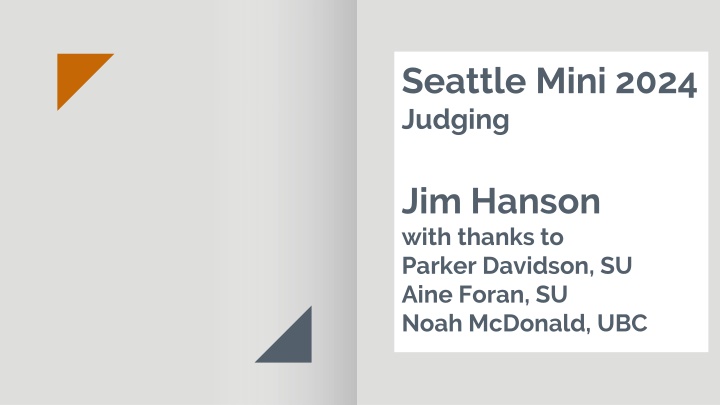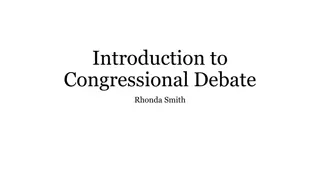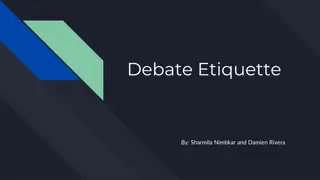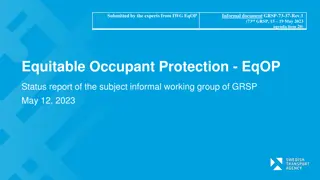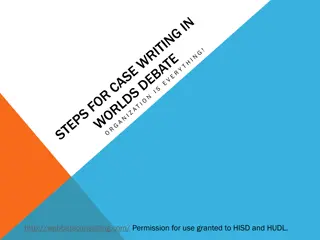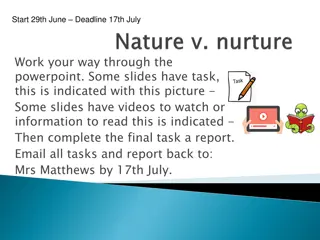Tips for Being a Supportive and Equitable Debate Judge
When judging a debate, it is crucial to be supportive, equitable, and respectful of all participants. Providing opportunities for debaters to state their pronouns and important information, avoiding favoritism, and embracing diversity are key aspects of being a good judge. Actively listening, taking notes, and showing support for each debater are essential in creating a fair and inclusive debating environment. Remember, being a supportive and listening judge enhances the overall debate experience for everyone involved.
Download Presentation

Please find below an Image/Link to download the presentation.
The content on the website is provided AS IS for your information and personal use only. It may not be sold, licensed, or shared on other websites without obtaining consent from the author.If you encounter any issues during the download, it is possible that the publisher has removed the file from their server.
You are allowed to download the files provided on this website for personal or commercial use, subject to the condition that they are used lawfully. All files are the property of their respective owners.
The content on the website is provided AS IS for your information and personal use only. It may not be sold, licensed, or shared on other websites without obtaining consent from the author.
E N D
Presentation Transcript
Seattle Mini 2024 Judging Jim Hanson with thanks to Parker Davidson, SU Aine Foran, SU Noah McDonald, UBC
Judging at the Tournament
Step 1: During the Debate Be a Supportive Judge
Provide opportunity for each debater to state pronouns and anything that is important to them respect what they say Treat each and every participant with support and equity. Be a supportive, treat people right judge.
Dont favor someone; don t disfavor someone Make the round inclusive everyone should feel empowered to participate Carefully listen to the debaters Take Notes. Be a supportive, equitable judge.
Be supportive of those who speak differently from what you are used to hearing Be supportive of those whose experiences are different than yours. Be a supportive judge respecting differences.
Take notes Listen thoughtfully Show support for each debater. Be a supportive, listening judge.
Two Things about your Debate Topic Information Slides Points of Information
When Topics get announced, they sometimes When Topics get announced, they sometimes have an accompanying Info Slide have an accompanying Info Slide INFO SLIDES help provide information and context for INFO SLIDES help provide information and context for topics. topics. INFO SLIDES do not preclude additional information that INFO SLIDES do not preclude additional information that debaters may provide in a debate. debaters may provide in a debate. INFO SLIDES are not INFO SLIDES are not argument slide argument slides; they explain the situation in which you debate the motion situation in which you debate the motion. . s; they explain the
A Few Things on POIs A Few Things on POIs Debaters have 15 seconds to ask a question during unprotected time. Speakers can and should interrupt at 15 seconds. Each Speakers should take 1 or 2 POIs. Judges should take note of who is seeking POIs and which team s POI s are being taken. Example: If OG has requested a POI 4 times and CO doesn t take them but takes CG the first and only time they stand up, that is likely indicative of CO being unwilling to engage with OG. Debaters who are waved down from asking a POI, along with the rest of the bench need to wait 15 seconds before requesting another POI.
Step 2: Debate Concludes Judges rank and score speakers to themselves
As a Judge --Consider yourself an average, intelligent person --Without specialized knowledge but also not unaware.
Be Open Minded Assess arguments as the _debaters_ made and refuted them Judges do NOT refute arguments that is the debaters job Judge should be willing to be persuaded Should follow BP Rules and Common Sense. As a Judge . . .
DO NOT: Count the number of arguments and use that as a basis to determine a winner How NOT to judge DO NOT: Rank based on style, speaking your ranking should be based on the argument content. Focus on which teams presented the most important/well mechanized and impacted arguments.
DO NOT: Insert your specific knowledge into assessing an argument If a team makes a statement you know is factually wrong, but no other team challenges it, you cannot use the fact that you know it is factually wrong to adjudicate the debate. How NOT to judge However, if a team says something that goes against common sense, it s fine to penalize them For example: Joe Biden lost the election , North Korea is a functional democracy , China is a country in Africa.
TEAM RANKINGS ARE 1, 2, 3, 4. Step 2: Rankings should be based on which teams make better New arguments that are relevant, justified and have the most impact The team with the *unique material that is *best mechanized *and most relevant should be ranked better with consideration for refutation, modeling in the PMC, and adherence to BP rules during a debate.
UNIQUE MATERIALThe argument/analysis was first presented by the team in the debate Step 2: Rankings should be based on which teams make better New arguments that are relevant, justified and have the most impact Teams making arguments that were already raised in the debate by another team those arguments should not count (or at least count very little). However, if a team makes significantly new analysis and points on an issue that new analysis and points should count.
Step 2: Rankings should be based on which teams make better New arguments that are relevant, justified and have the most impact BEST MECHANIZED The argument is explained well, shows how it works/happens, supported by good reasons, examples, evidence and is believable.
MOST RELEVANTThe argument is applicable to the key issues on the motion. Usually, this means the argument is: 1) relevant to the stakeholders the people/group/institution most important to the motion 2) Relevant to the burdens/frameworks the debaters have presented 3) Is shown to be most probable/ likely and the strongest principal and/or consequences relevant to the stakeholders/burdens/motion. Step 2: Rankings should be based on which teams make better New arguments that are relevant, justified and have the most impact
Step 2: Rankings should be based on which teams make better New arguments that are relevant, justified and have the most impact So again . . . After you ve identified the UNIQUE MATERIAL WEIGH WHICH ARGUMENT WAS BEST MECHANIZED AND MOST RELEVANT WITH THESE PROVISIONS . . .
Teams are also assessed based on . . . Refutation Rebuilding of Partner s Arguments (NOT rebuilding of other teams arguments including closing debaters do NOT get assessed very much if at all on rebuilding the opening team s arguments) Step 2: Factors that make arguments more persuasive Debaters do their speaking position in a way that helped advance arguments in the debate (especially the PMC with MODELING setting up what is to be debated) Adherence to BP Rules.
Teams are NOT ranked based on How well they speak Step 2: Factors that make arguments more persuasive The personal/group identity experiences expressed in arguments don t match up with yours Carefully crafted wording that may not be accessible to all in the round.
Step 3: Chair asks for discussion of Rankings
REFRESHER After you ve identified the UNIQUE MATERIAL WEIGH WHICH ARGUMENT WAS BEST MECHANIZED AND MOST RELEVANT Weigh Unique Arguments best mechanized and most relevant With the PROVISO that you consider Refutation, Rebuilding of _Partner s_ arguments, Modeling, and BP Rules.
Chairs . . . Give each judge a chance to state their rankings and to give _concise_ rationales for those rankings Differences in opinions? Focus on that and find out a way to compromise considering the reasons for the rankings. Involve All
Chairs should give each person a chance to be heard but . . . keep on track to complete the rankings & speaks in 15 minutes Compromise when it makes sense, support rankings when that makes sense Finish up in 15 minutes Can t all agree? Have 3 Judges? You can have a split with 2 of 3 judges deciding. Have 2 Judges? The Chair decides.
Step 4: Discuss Speaks (Speaker Points)
Step 4 Discussing Speaks Chairs . . . - Give each judge a chance to state their speaker points - Remember that teams with better rankings must get better speaker points - Often, averaging panelists scores solves differences. - REMEMBER: Deliberation including speaks can be 15 minutes AT MOST. If no consensus, vote.
Point Scale Refresher 86+ Unbelievably good flawless. 80-85 Very good arguments at a high level in all ways. 76-79 Above average mostly good arguments 70-75 Average some decent and some weak arguments 65-69 Needs major work weaker arguments 64- Very serious problems in arguments, rude or inappropriate **Stronger arguments are unique, well mechanized, and very relevant. And, consider modeling, refutation, rebuilding and rules adherence.**
Style is important for clarity, but is ultimately irrelevant for content. Be careful of bias in favor of native english speakers. REMEMBER Be careful of bias in favor of experiences and identities especially those prominent in your larger community/culture. Accept and respect difference in the speaker points you give.
No one should receive high points nor rank highly in a round by reputation alone Do not reduce a score because the other speeches were bad, and do not increase one because everyone else was excellent. REMEMBER
Step 5: Chairs Submit the Ballot!
Submit Ballots within 15 minutes Type in your rankings and points! You have 15 minutes we will go to your room and request a ballot asap if we have not received it.
Step 6: Talk to the Debaters
Step 6: Give your RFD (Reason for Decision) Give an RFD after ALL PRELIMS. SU does NOT HAVE ANY Closed Prelim Rounds. The Chair gives the RFD unless the two panelists rolled the vote (outvoted the chair) in which case one of the panelists gives the RFD.
Step 6: Give your RFD (Reason for Decision) Your RFD should be concise (<5min). Announce the rankings, then explain why. PLEASE TELL EACH TEAM concisely what they could have done to rank higher.
Give feedback to individual debaters after the round IF they request it. Please do NOT keep everyone in the room to speak to one or two debaters for long periods of time Debaters and judges need to get to the next round. DO NOT HOLD UP THE TOURNAMENT.
Be Ready for the Next Round and Have a Great Tournament!
